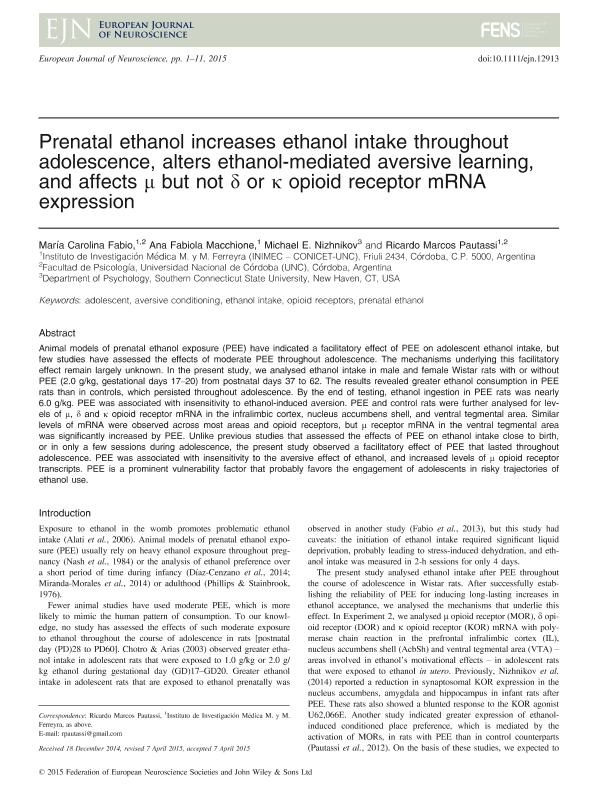Artículo
Prenatal ethanol increases ethanol intake throughout adolescence, alters ethanol-mediated aversive learning, and affects μ but not δ or κ opioid receptor mRNA expression
Fecha de publicación:
04/2015
Editorial:
Wiley Blackwell Publishing, Inc
Revista:
European Journal Of Neuroscience
ISSN:
0953-816X
Idioma:
Inglés
Tipo de recurso:
Artículo publicado
Clasificación temática:
Resumen
Animal models of prenatal ethanol exposure (PEE) have indicated a facilitatory effect of PEE on adolescent ethanol intake, but few studies have assessed the effects of moderate PEE throughout adolescence. The mechanisms underlying this facilitatory effect remain largely unknown. In the present study, we analysed ethanol intake in male and female Wistar rats with or without PEE (2.0 g/kg, gestational days 17-20) from postnatal days 37 to 62. The results revealed greater ethanol consumption in PEE rats than in controls, which persisted throughout adolescence. By the end of testing, ethanol ingestion in PEE rats was nearly 6.0 g/kg. PEE was associated with insensitivity to ethanol-induced aversion. PEE and control rats were further analysed for levels of μ, δ and κ opioid receptor mRNA in the infralimbic cortex, nucleus accumbens shell, and ventral tegmental area. Similar levels of mRNA were observed across most areas and opioid receptors, but μ receptor mRNA in the ventral tegmental area was significantly increased by PEE. Unlike previous studies that assessed the effects of PEE on ethanol intake close to birth, or in only a few sessions during adolescence, the present study observed a facilitatory effect of PEE that lasted throughout adolescence. PEE was associated with insensitivity to the aversive effect of ethanol, and increased levels of μ opioid receptor transcripts. PEE is a prominent vulnerability factor that probably favors the engagement of adolescents in risky trajectories of ethanol use.
Archivos asociados
Licencia
Identificadores
Colecciones
Articulos(CIQUIBIC)
Articulos de CENTRO DE INVEST.EN QCA.BIOL.DE CORDOBA (P)
Articulos de CENTRO DE INVEST.EN QCA.BIOL.DE CORDOBA (P)
Articulos(INIBIBB)
Articulos de INST.DE INVEST.BIOQUIMICAS BAHIA BLANCA (I)
Articulos de INST.DE INVEST.BIOQUIMICAS BAHIA BLANCA (I)
Articulos(INIMEC - CONICET)
Articulos de INSTITUTO DE INV. MEDICAS MERCEDES Y MARTIN FERREYRA
Articulos de INSTITUTO DE INV. MEDICAS MERCEDES Y MARTIN FERREYRA
Citación
Fabio, Maria Carolina; Macchione, Ana Fabiola; Nizhnikov, Michael E.; Pautassi, Ricardo Marcos; Prenatal ethanol increases ethanol intake throughout adolescence, alters ethanol-mediated aversive learning, and affects μ but not δ or κ opioid receptor mRNA expression; Wiley Blackwell Publishing, Inc; European Journal Of Neuroscience; 41; 4-2015; 1569-1579
Compartir
Altmétricas
Items relacionados
Mostrando titulos relacionados por título, autor y tema.
-
Aronne, María Paula ; Alimonta Rios, Ruben; Pecile, Andrea Noemi ; Brusco, Herminia Alicia (Ashdin Publishing, 2013-10)
-
March, Samanta Mabel ; Pautassi, Ricardo Marcos ; Nizhnikov, Michael; Fernandez Vidal, Juan Miguel ; Spear, Norman E.; Molina, Juan Carlos (Universidad de Oviedo, 2013-07)




